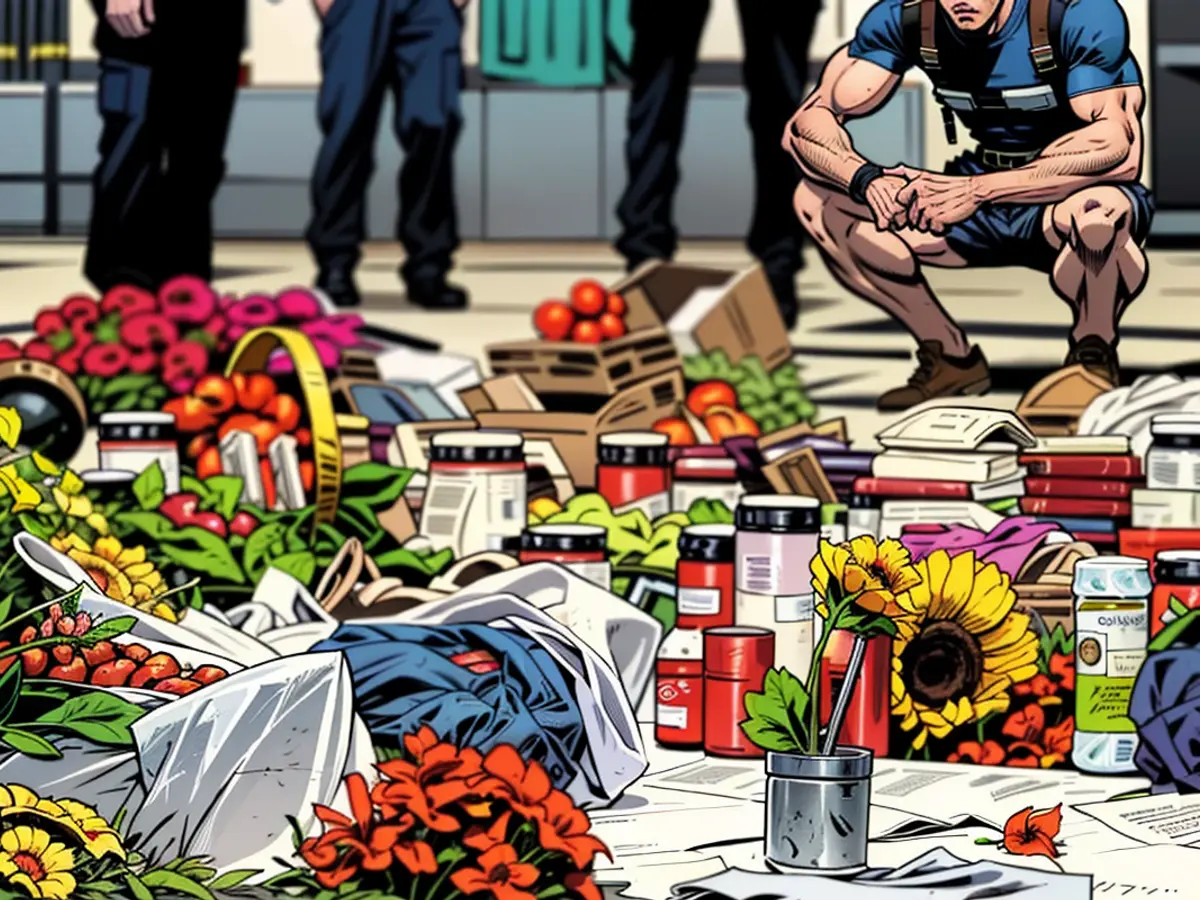- Olaf Scholz, Germany's Chancellor, is set to visit Solingen.
Following the lethal knife attack in Solingen, there's an increasing clamor for stricter immigration regulations and gun control. Simultaneously, there's a demand for clarity on why the authorities failed to deport a Syrian asylum seeker last year who ended up carrying out the attack with three fatalities on a Friday evening. Chancellor Olaf Scholz (SPD) and North Rhine-Westphalia's Minister President Hendrik Wüst (CDU) are scheduled to pay tribute to the victims of the knife attack in Solingen today.
At a city festival in Bergisches Land, eight individuals were injured, four of them seriously. A 26-year-old suspect, a Syrian, has been in custody since Sunday evening, among other things, on charges of murder and affiliation with the terrorist organization Islamic State (IS). The terrorist organization has claimed responsibility for the attack and published a video on Sunday that is said to depict the perpetrator. However, it's yet uncertain when the video was recorded or if it actually shows the perpetrator.
The Suspect Should Have Been Deported
According to Spiegel, the suspect entered Germany at the end of 2022 and applied for asylum. The security authorities were unaware of him as an Islamic extremist. These details were confirmed to the German Press Agency. The asylum application of the suspect was rejected, resulting in his scheduled deportation to Bulgaria last year. He had entered the EU through Bulgaria, but due to going underground in Germany, the deportation was initially postponed, as reported by the "World."
NRW Interior Minister Herbert Reul (CDU) mentioned in the ARD programme "Caren Miosga" that the suspected attacker did not go underground in a legal sense. He simply wasn't there when he was supposed to be picked up. "He was frequently present at the facility," Reul added, expressing doubts about the correctness, sufficiency, or exaggeration of these procedures.
NRW's Minister President Wüst called for an investigation within the authorities, stating, "There are a lot of questions that need to be clarified. If something went wrong, clear language must be used, regardless of which authority it is, whether it's local in Bielefeld, in Paderborn, or at state or federal authorities."
According to a survey by the Federal Office for the Protection of the Constitution, the attack in Solingen was the most serious attack suspected of having Islamic motives in Germany since the attack on a Christmas market in Berlin in December 2016, with 13 deaths and 64 injuries at the time.
Merz: Ban on Admitting Refugees from Syria and Afghanistan
CDU leader Friedrich Merz hardened his tone towards Chancellor Olaf Scholz (SPD) a week before the state elections in Saxony and Thuringia, calling for a ban on admitting refugees from Syria and Afghanistan in Germany. In his email newsletter "MerzMail," he wrote, "After the terrorist act in Solingen, it should finally be clear: It's not the knives that are the problem, but the people who carry them. In the majority of cases, these are refugees, and in the majority of cases, Islamic motives are behind the acts."
In the ARD's "Brennpunkt," Merz stated, "If Solingen isn't the turning point for the coalition now, I don't know what else needs to happen for some people to finally come to their senses."
Union faction deputy Jens Spahn (CDU) advocated for border closures to stop irregular migration. He told the "Rheinische Post" (Monday), "For years, hundreds of young men from Syria and Afghanistan have been coming to Germany and Europe every day. This must finally stop."
Chancellor Scholz had already announced in June, following the fatal stabbing attack in Mannheim, that he would resume the deportation of serious criminals and terrorist threats to Afghanistan and Syria.
SPD leader Esken: Ban on Admissions Not Compatible with Laws
SPD leader Saskia Esken rejected Merz's demand for a ban on admissions, stating that such a step "is not compatible with our laws, neither with the European Refugee Convention nor with our constitution." However, serious criminals and Islamic threats can be deported to these countries.
Bavaria's Minister-President Markus Söder (CSU) said in the ARD that criminals should be immediately detained and expelled, especially to Syria and Afghanistan. More powers should be granted to the police for controls.
President Frank-Walter Steinmeier also called for an expansion of the powers of the security authorities. "To better protect against attacks, it is also necessary that the security authorities are equipped with the necessary powers," he said in the ZDF summer interview. Steinmeier called for more personnel for the security authorities. However, an expansion of the powers of the Bundeskriminalamt, for example, is also conceivable in the event of a terrorist threat.
Buschmann Initiates Negotiations on Knife Regulations
Federal Government Occupations revolve around knife regulation discourse. Minister of Justice Marco Buschmann voiced, "We'll delve into the federal realm, exploring ways to bolster our efforts against knife-related offenses." The Free Democratic Party (FDP) representative conveyed this statement to "Bild am Sonntag." The FDP has thus far, resisted stricter legislation and prohibitions pushed by Federal Interior Minister Nancy Faeser (SPD).
In light of the revelation that the suspect in the knife attack had a rejected asylum application and a scheduled deportation, there's growing concern about the failures in enforcement of immigration regulations. The suspect, who entered Germany at the end of 2022, was scheduled for deportation to Bulgaria due to his past as an Islamic extremist, but his deportation was postponed due to his absence when officials attempted to pick him up.
The calls for stricter enforcement of immigration regulations and gun control, triggered by the fatal knife attack in Solingen, take on a more urgent tone in the wake of these new details.








